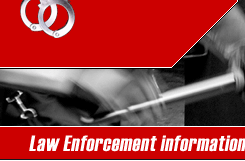Are you noticing more and more people receiving moving violations these days? Have you wondered what's going on. Truckers panic when they see the highway patrol behind them because they can lose their license for having even minor Department of Transportation violations. The solution a lot of communities use to solve their budget problems is increased ticketing. In many places, since 9/11, there has been an increased police presence in order to detect potential terrorist activity or in some areas to catch illegal aliens.
But let's face it, most cities are faced with budget deficits and in these tough economic times traffic tickets are an easy form of taxation to balance the books. The reality is that in many communities when the police see an out of state driver, they can pretty much count on the uncontested fine being paid because the tourist isn't coming back to fight it. The cost of hiring and training a traffic officer is approximately $75,000 per year but he or she can issue between $150,000 to $200,000 in citations. How many businesses can equal that rate of return? There are many towns like New Rome, Ohio and Waldo, Florida where over 70% of their entire operating budget comes from the fines generated by moving violations. You may be thinking, "How does this affect me? I am a good driver and I hardly ever get tickets." Just because you haven't done anything wrong doesn't mean you won't see those dreaded blue lights flashing in your rear view mirror.
If that does happen you need to know that the true cost of a moving violation has drastically changed in the last few years. As examples of the effects of receiving tickets let's look at some real world examples. Mary is a busy sales representative who has a company car. She travels extensively and has received four speeding tickets in the last three years. She considers herself a safe driver and in each instance was traveling with the flow of traffic on the freeway. She has 9 out of the 12 points on her driver's license.
Mary was shocked when her employer's insurance carrier refused to allow her to drive a company car. The company obtained supplemental insurance but Mary had to pay the extra $1600. Our next victim is Jeffrey, a CDL truck driver from Ohio who is an independent operator and owns his own truck. He drives 150,000 miles per year and has five tickets on his record, none a serious violation.
He can't get affordable insurance so he is in the process of losing his truck to the finance company and doesn't know how he will support his family. Families with teenagers may face an economic disaster if the teen driver receives a citation. One traffic ticket for rolling through a stop sign could cost as much as $3000 in increased premiums over the three years it remains on their record. The insurance industry defines teenagers as being anyone up to age 23.
Relating Mary and Jeffrey's stories is not about you feeling sorry for them, it is to impress upon you the severe consequences that can come from receiving a traffic ticket. Of course you should obey all traffic laws, not just for your physical protection but also to protect your wallet. But how often are drivers following the laws but are just in the wrong place at the wrong time and are going to be used to help balance the local budget? It is happening more and more often and you or someone in your family could be next. What should you do if you receive a citation? Never just pay a ticket. Check with the clerk of the court to see if you are eligible for traffic school, even if it is an out-of-state citation. Many localities accept online traffic school.
Check to see if this is available in your state at http://www.trafficschoolonline.com/?lcode=4013 If traffic school is not available then you or your attorney need to appear in court to contest the speeding ticket. Hiring an attorney may be your most cost effective option when you consider the additional cost of your insurance. Check with your insurance agent to find out the consequences of the original charge being entered on your driving record. The American Bar Association says: "The best way for the majority of Americans to be able to assure themselves of legal assistance when they need it.
is through a prepaid legal plan." Legal insurance works for your legal bills the same way medical insurance works for your medical expenses. Some things are covered for no extra cost and others are available for a discount. When I saw how this insurance worked in July of 2006, I immediately got it for my family and am very impressed at how it delivers liberty and justice for all and not just for those who can afford it.
Ms. Rachman has been a lawyer since 1996 but has been disturbed that you only get the liberty and justice you can afford. Then she discovered that is not true when you have legal insurance and her advice to those seeking a referral is to get legal insurance. For more information go to http://www.prepaidlegal.com/hub/brachman


